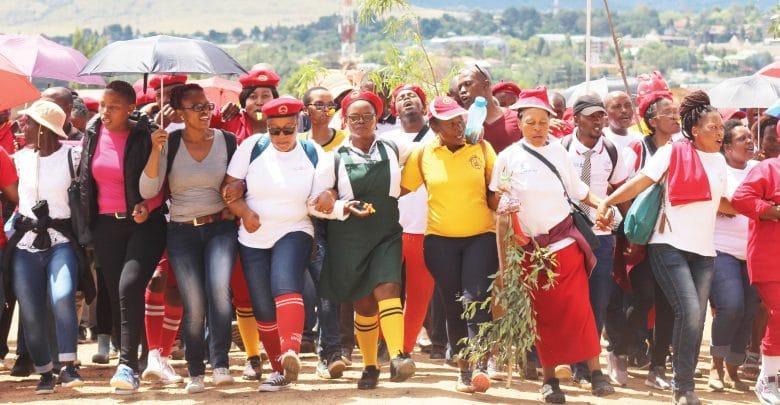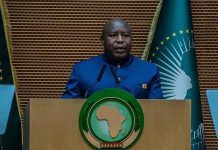Africa-Press – Lesotho. When the teachers take to the streets on Monday, it will be the second industrial action they stage within five months after the initial one was suspended following an unsuccessful agreement with the ministry of education and training.
The teachers, who have lost faith in the government, are adamant about downing their trade tools and are not prepared to back down. If the government fails to compromise and meet the teachers halfway, the latter are determined to keep their mass action rolling until the end of the year.
The decision to embark on the Monday picketing comes after long, failed negotiations and court battles which saw the Directorate of Dispute Prevention and Resolutions (DDPR) last week granting the Lesotho Association for Teachers (LAT) a certificate to strike.
According to the president of LAT, Letsatsi Ntsibolane teachers will attend classes for a week every month and stay away for three weeks. During their envisioned nationwide industrial action, they will picket every Wednesday at selected district education offices for the three weeks they stay away.
Education minister Professor Ntoi Rapapa says the fracas between teachers and the ministry, among others, stems from a 2010 education policy that stipulates that teachers’ salaries will be increased in accordance with their qualifications, notwithstanding classes such teachers teach.
The policy was amended in 2015 as government was virtually struggling to cover the teachers’ salaries. The amended shows that now teachers will be promoted through their respective performance and that they are eligible to apply for vacant posts commensurate with their qualifications.
Rapapa took a swipe at the ministry for enacting laws and policies as well as signing certain contracts without comprehensive consideration of whether or not it would afford them. Among others, the teachers want threats their union leaders are receiving to stop.
They demand an amendment of the Education policy, reverting performance contract, payment of outstanding salaries and allowances, correction salary errors on their performance based contracts dating back to 2009 and salaries that match their academic and professional qualifications.
They also want the ministry to weed out ghost workers from its payroll and evaluate the career structure. Educators further demand to undergo proper training that is relevant to the new education curriculum.
They also want both essential resources and infrastructure facilities to be availed to them. In addition, the teachers are also not happy about the long time they have to wait for their pensions after their retirement.
They have, as a result, proposed to the ministry that instead of getting the 25 percent lumpsum and 75 percent in instalments when they retire, they would rather be given the money in 50 percent lumpsum and 50 percent monthly instalments.
Ntsibolane says the ministry also signed a contract with school principals to the effect that they would no longer be engaged on a permanent and pensionable basis but on five-year performance contracts.
He, however, says since the signing of the contract, principals have not been paid and instead the ministry scrubbed off their contracts. Principals who were not engaged on a contractual basis acted in their respective schools without getting acting allowances.
For that reason, they want their reverting contract allowances, acting allowances and demand that their career and salary structures be reviewed. Ntsibolane says none of their grievances have since been addressed, adding the ministry also failed to keep its part of the bargain.
Terms of the agreement, he says, ought to have been implemented by October, but the ministry has simply ignored them and, instead, went behind their backs to challenge their case before the DPPR.
“This goes to show how much the ministry cannot be trusted,” he says.
It is on record that on December 28, 2018 the ministry tabled another agreement that they promised to abide by but teachers’ unions shot it down saying it had nothing tangible for them.
“All the ministry did was make promises which it never fulfilled and instead came up with delaying tactics.
“Instead of addressing our grievances, we have been in and out of courts of law with the ministry challenging our conciliation and industrial actions until recently we were finally granted the certificate to strike,” he says.
For his part, Letampu Mafaesa from the Lesotho Teachers Trade Union (LTTU) echoes Rapapa’s sentiments on the causes of the long-standing strife between teachers and the ministry.
But Mafaesa is quick to show that after the ministry failed to keep its side of the bargain, it amended the Education Policy without warning the teachers.
The amendment on the policy, he says, does not serve justice to the teachers since it simply just cuts them off instead of accommodating the ones who were already studying because they were persuaded by the policy.
He feels the policy should have acted on the teachers who had not yet started upgrading their qualifications and adds that principals who were not contracted started acting but have not been given an acting allowance since 2013.
“Principals therefore demand the performance contract allowances the government promised to give them every five years,” he says.
Education analyst Prof Kopano Makoa says the teachers’ salary problems emanate from policies that were made without proper consideration of the impact they might bring in the long run.
Makoa, however, quickly adds that whoever made the policies did so with good intention. According to him, there is not much difference between teachers and other civil servants because they are all paid according to their respective qualifications.
But he says the teaching fraternity gets narrower on its way up the ladder, forcing more highly qualified teachers to teach lower grades. He believes teachers should communicate with the government before furthering their studies in respect of both their salaries and career structures.
“It would also be imperative for them to establish whether or not the course they wish to pursue would benefit the national education system.
“It would also be better for teachers to consider changing professions as they upgrade themselves to avoid the congested fields,” Makoa says.
Rapapa told this paper late last year that the government was reviewing certain laws and policies but would not be drawn to give an overnight decision as some changes still had to be effected on some of the laws and policies.
He said the Prime Minister had emphasised that it was the teachers’ right to get training on the new integrated curriculum. Hence, the ministry held several meetings with professors from Lesotho College of Education (LCE) and National University of Lesotho (NUL) to discuss means to help teachers get training during school holidays.
Commenting on the new curriculum Rapapa said syllabuses have changed in different countries and working teachers are trained on the new curriculum, adding that Lesotho was no exception.
“However, the major challenges we are faced with are lack of resources such as classrooms and toilet facilities and shortage of teachers. It is clear that the Lesotho budget fails to cover these needs at the moment but we are still seeking solutions,” he said.
While teachers are preparing to embark on a go-slow the ministry, on the other hand, has filed an appeal before the Labour Appeal Court, challenging the DDPR’s decision that granted teachers the green light to strike on Monday.
In a bid to get to the bottom of the dispute, the government created a subcommittee made up of various ministers that will work with the education ministry on the issue.
Minister of communication, science and technology Thesele ’Maseribane told a press briefing that the committee has already passed a bill that principals would be engaged on pensionable basis.
’Maseribane, who is also the chairman of the subcommittee, said the bill also stipulates that teachers will go on pension at the age of 60 instead of 65 with an option for early retirement.
He said the ministry has paid 114 principals who were on performance contracts a total of M22 million. “It also paid arrears in teachers’ salaries amounting to M52 million and is currently working on ways to pay the remaining teachers and principals.
’Maseribane said teachers’ training on the new curriculum is in process as per the agreement between teachers and the ministry of education.
“The specialists engaged by the World Bank to review the teachers career structure are underway and will be completed before the end of March,” he said. The subcommittee, he said, would before the end of the week have communicated with teachers to agree on the way forward and resolve the matter.
For their part, the teachers are taken aback by the subcommittee’s announcement that it has paid principals and teachers the said amounts without doing proper research.
According to Ntsibolane, apart from principals, teachers were owed approximately M60 million but the ministry has only paid teachers less than M20 million.
He expressed disappointment at the newly formed subcommittee that claims to have resolved their issues without calling them to a meeting and getting their side of the story.
For More News And Analysis About Lesotho Follow Africa-Press






